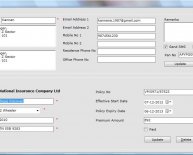
Car, Vehicle Insurance
 Car insurance is a must if you own a vehicle, and you’ll be glad you have it after an accident. But you don’t want to spend a penny more than necessary on a policy, and you shouldn’t have to. By knowing exactly what affects your auto insurance rates, you can figure out how to save on car insurance and get good coverage without breaking the bank.
Car insurance is a must if you own a vehicle, and you’ll be glad you have it after an accident. But you don’t want to spend a penny more than necessary on a policy, and you shouldn’t have to. By knowing exactly what affects your auto insurance rates, you can figure out how to save on car insurance and get good coverage without breaking the bank.
Drive safely
Traffic tickets and accidents drive up car insurance premiums. If you get a ticket, you may be offered the opportunity to go to traffic school to get it dismissed or reduce the number of violation points that go on your driving record. If you can keep the violation off your driving record, the time spent in class could save you hundreds of dollars over several years.
Drop car insurance you don’t need
If you’ve got a clunker, it might be time to drop collision and comprehensive insurance, which pay for damage to your vehicle. Collision insurance pays to repair damage to your car if it crashes into another vehicle or object, or flips over. Comprehensive insurance pays if your car is stolen or damaged by storms, vandalism or by hitting an animal such as a deer.
If your car is worth less than your deductible plus the amount you pay for annual coverage, then it’s time to drop them. Collision and comprehensive never pay out more than the car is worth. Evaluate whether it’s worth paying for coverage that may reimburse you only a small amount, if anything.
If you drop collision and comprehensive, set aside the money you would have spent in a fund for car repairs or a down payment on a newer car once your clunker conks out.
Drive a car that’s cheap to insure
Before you buy your next car, check car insurance rates for the models you’re considering. The vehicle you drive affects your car insurance premium, particularly if you buy collision and comprehensive coverage. Safe and moderately priced vehicles such as minivans and small SUVs tend to be cheaper to insure than flashy and expensive cars.
Increase the deductible
You can save money on collision and comprehensive by raising the deductible, the amount the insurance company doesn’t cover when paying for repairs. For example if the repair bill is $2, 000, and you have a $500 deductible, the insurer will pay out $1, 500.
NerdWallet research found that raising the deductible from $500 to $1, 000 saved about $200 a year, on average. Our research was based on only two sample states, and savings vary by company, so compare quotes with different deductible levels before you decide.
Take advantage of car insurance discounts
Every insurance company offers special ways to save. To make sure you’re getting all the discounts you’re entitled to, ask your agent to review your possible savings. Here are the most common ways to get a discount:
- Buy more than one type of policy, such as car and home insurance or car and life insurance, from the same company for a “bundling” discount.
- Insure more than one car with a company for a multi-vehicle discount.
- Be a good student. High school and college students can show proof of good grades if they have at least a B average.
- Enroll your teen drivers in driver-training classes.
- Don’t let a college student take a car to school. Parents can get a discount for kids on their policy who attend school at least a minimum distance away from home, such as 100 miles.
- Get a mature driver’s discount if you’re 55 or older. This may require taking a defensive driving course.
- Maintain a clean driving record.
- Get discounts for safety features such as airbags, anti-lock brakes and anti-theft devices, such as alarm systems.
Improve your credit
Your credit is a big factor when car insurance companies calculate how much to charge. It can count even more than your driving record in some cases. (This is not true in California, Hawaii and Massachusetts, where insurers aren’t allowed to consider credit when setting rates.)
To improve your credit for better car insurance rates, focus on these three steps:
- Make all your loan and credit card payments on time.
- Keep credit card balances well below your credit limits.
- Open new credit accounts only when necessary. Applying for too many credit cards can hurt your score.
Don’t drive a lot? Consider usage-based insurance
If you don’t drive much, consider an insurer that offers a usage-based driving program. These policies base rates in part on how much you drive and, in some cases, how well you drive. To participate, you install a small device in your car that transmits data to the insurance company. You score a discount for low mileage and, with many programs, safe driving habits.

















